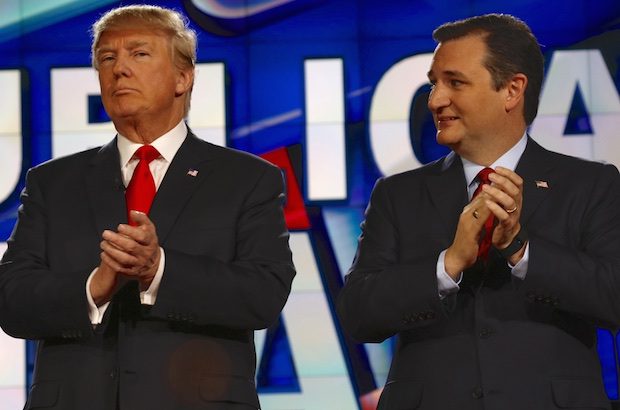The Limits of the Cruz-Kasich Pact

Cruz and Kasich made a deal to focus their resources on different states to make it easier to stop Trump, but the anti-Trump pact is already running into problems:
The marriage of political convenience between Ohio Gov. John Kasich (R) and Sen. Ted Cruz (R-Tex.) was tested less than 12 hours into the honeymoon, as Kasich told reporters that he still wanted votes from his supporters in Indiana.
“I’ve never told ’em not to vote for me,” Kasich told reporters at a retail stop in Philadelphia. “They ought to vote for me. But I’m not over there campaigning and spending resources.”
The best that can be said for the Cruz-Kasich pact is that the two campaigns won’t be actively competing against each other in Indiana, Oregon, and New Mexico, but that doesn’t extend to urging supporters of the weaker non-Trump candidate in a given state to vote for the stronger one. Of course, the candidates’ supporters could vote tactically on their own without encouragement from Cruz or Kasich, but most aren’t likely to do that given the very different profiles of their respective voters.
The fact that Kasich doesn’t want to urge his supporters in certain states to back Cruz points to two of the main weaknesses of the anti-Trump effort that have dogged it from the beginning. The first is that anti-Trump Republicans have done and continue to do a terrible job of coordinating their efforts. The deal that Cruz and Kasich have made is the first time that the non-Trump campaigns have tried to cooperate in preventing Trump’s nomination, and even here the cooperation is limited to an agreement not to undermine one another. Most Republican voters aren’t committed to blocking Trump, and those that want to block him can’t ever seem to get their act together.
The other weakness of the anti-Trump effort is that many Cruz and Kasich voters prefer Trump to the other non-Trump candidate. A pact between the other candidates doesn’t necessarily translate into a defeat for Trump anywhere. If their favorite candidate isn’t going to make an effort in their state, some current Cruz and Kasich supporters might end up drifting into Trump’s camp. Cruz can’t count on Kasich’s mostly moderate voters to rally behind him, and Kasich likewise can’t assume that Cruz’s very conservative voters would go to him. Despite the candidates’ desire to create a united front against Trump, many of their supporters dislike Trump less than they dislike the other alternative. Trump consistently gets strong support from the others’ best ideological groups, which puts him in a good position to benefit when either one slackens his effort in a given state.
Comments